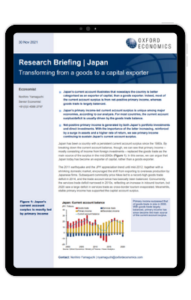Japan transforming from a goods to a capital exporter

Japan has been a country with a persistent current account surplus since the 1980s. By breaking down the current account balance, though, we can see that primary income – mostly consisting of income from foreign investments – replaced the goods trade as the main source of the surplus in the mid-2000s. In this sense, we can argue that Japan today has become an exporter of capital, rather than a goods exporter.
What you will learn:
- Japan’s primary income-led current account surplus is unique among major economies, according to our analysis. For most countries, the current account surplus/deficit is usually driven by the goods trade balance.
- Net-positive primary income is generated by both Japan’s portfolio investments and direct investments. With the importance of the latter increasing, reinforced by a surge in assets and a higher rate of return, we see primary income continuing to sustain Japan’s current account surplus.
Tags:
Related Services

Post
UK: Supply constraints are probably less prominent in the south
The extent to which UK employers can respond to likely 2024 interest rate cuts with increased output, rather than rises in prices and wages, will partly reflect the extent of spare capacity. This will inevitably vary by region. Evidence on this is imperfect, but in terms of capital assets (including intangibles) and labour availability, southern regions appear to be in a stronger position than those in the UK's traditional industrial heartland.
Find Out More
Post
Global Private equity real estate fund maturities spur asset sales
We expect the significant increases in fund maturities, spurred by capital raised over the past decade, to exert upward pressure on the rate of asset disposals as the funds approach the end of their lifecycles.
Find Out More